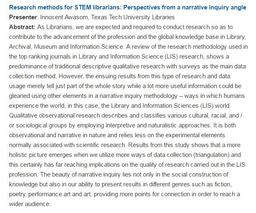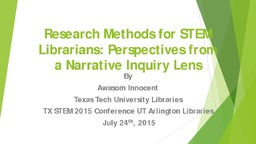
ATTENTION: The works hosted here are being migrated to a new repository that will consolidate resources, improve discoverability, and better show UTA's research impact on the global community. We will update authors as the migration progresses. Please see MavMatrix for more information.
Show simple item record
| dc.contributor.author | Awasom, Innocent | |
| dc.date.accessioned | 2016-08-30T22:34:23Z | |
| dc.date.available | 2016-08-30T22:34:23Z | |
| dc.date.issued | July 23-24, 2015 | |
| dc.identifier.uri | http://hdl.handle.net/10106/25855 | |
| dc.description.abstract | As Librarians, we are expected and required to conduct research so as to contribute to the advancement of the profession and the global knowledge base in Library, Archival, Museum and Information Science. A review of the research methodology used in the top ranking journals in Library and Information Science (LIS) research, shows a predominance of traditional descriptive qualitative research with surveys as the main data collection method. However, the ensuing results from this type of research and data usage merely tell just part of the whole story while a lot more useful information could be gleaned using other elements in a narrative inquiry methodology – ways in which humans experience the world, in this case, the Library and Information Sciences (LIS) world. Qualitative observational research describes and classifies various cultural, racial, and / or sociological groups by employing interpretive and naturalistic approaches. It is both observational and narrative in nature and relies less on the experimental elements normally associated with scientific research. Results from this study shows that a more holistic picture emerges when we utilize more ways of data collection (triangulation) and this certainly has far reaching implications on the quality of research carried out in the LIS profession. The beauty of narrative inquiry lies not only in the social construction of knowledge but also in our ability to present results in different genres such as fiction, poetry, performance art and art, providing more points for connection in order to reach a wider audience. | en_US |
| dc.language.iso | en_US | en_US |
| dc.subject | Librarians -- Research | en_US |
| dc.subject | Library and Information Science -- Research methodology | en_US |
| dc.subject | Narrative inquiry methodology -- STEM -- Library and Information Science | en_US |
| dc.title | Research methods for STEM librarians: Perspectives from a narrative inquiry angle | en_US |
| dc.type | Presentation | en_US |
Files in this item
- Name:
- Innocent Awasom.JPG
- Size:
- 105.5Kb
- Format:
- JPEG image
- Name:
- TX-STEM-2015-Research-Methods- ...
- Size:
- 65.23Kb
- Format:
- PDF
- Description:
- PDF
This item appears in the following Collection(s)
Show simple item record



